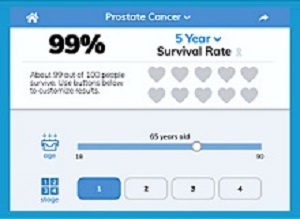Talking about cancer is hard. Talking about the chances of surviving cancer is even harder. Now, Stat News reports, one of the entrepreneurs behind the drug-pricing information site GoodRx wants to make conversations about cancer easier with a new site called CancerSurvivalRates.com.
Launched this month, its mission is to make information about cancer prognoses more accessible to patients and families. The idea is to improve on what people can find on the internet or even sometimes in their doctors’ offices, co-founder and drug supply chain veteran Stephen Buck said.
The report says oncologists may be leery of their patients’ relying on the web for cancer survival rates or estimates of how long a patient might live, particularly given how many factors come into play for any individual. But Buck, along with oncologists and other experts who have served as advisers on the project, say such information can be the basis for a deeper discussion with clinicians about what the future might hold.
“We designed this site to be extremely simple for people to understand. People aren’t versed in odds and survival rates. We wanted to say out of 10 people, how many are alive after one, two, or five years,” Buck said. “We want this to be a conversation starter, for someone to take this information and ask their physician, what do you think about my prognosis?”
The tool, which is free, asks users to enter information about their age and gender, then more details about their cancer diagnosis. Stage, grade, time since diagnosis, and histology can be entered to compute how many people survive for up to five years. The answers are based on public data gathered by the National Cancer Institute.
The need for clear and simple information stems in part from the shock patients and families may feel when they first hear the word “cancer,” Buck and his team said. Reeling from the diagnosis, patients may not be able to take in more than that one word. But once they get home, they – or their loved ones – may turn to Google to find out more about a particular cancer, treatments for it, and in the case of advanced or more serious cancers, how much time they may have.
“For patients and families, it can be pretty hard to track down accurate information about prognosis. It can get pretty technical pretty quickly,” said Dr Shoshana Ungerleider, an internist at Sutter Health in California who focuses on end-of-life care. She also served as an adviser on the project. “What I love about the product Stephen has created is patients can really be proactive if they want and say, well, I have just been diagnosed with stage 4 cancer. I do want to know what the future may hold for me.”
That’s where the conversation with an oncologist ideally comes in, proponents of the site say.
Dr Jennifer Temel, a thoracic oncologist at Massachusetts General Hospital who also studies doctor-patient communication, said she worries in general about online tools that provide prognoses.
She said she and her team use the first few visits with patients to help them and their families understand the diagnosis, then later talk about treatments and their goals. She might explain that chemotherapy, for example, could help some patients live longer but won’t cure their cancer.
“As a thoracic oncologist, many of my patients have a prognosis of months or a year and that is not something you want to find out on the internet without communication with a clinician, support from your oncology clinician, maybe support from social work and palliative care,” she said, speaking generally about websites offering information on cancer survival but not CancerSurvivalRates.com in particular.
“I worry that some of those objective tools don’t take into account some of those things about a patient’s health status or well-being,” she said. “From my perspective, more importantly, we just want to be there for our patients and families when they are getting information like this.”
Dr Jim Murphy, a radiation oncologist at the University of California San Diego, who is an adviser to the site, said any individual case will be nuanced, but the tool can give patients a big-picture view of their cancer, allowing them to later discuss issues with their doctors.
“I think prognosis can be difficult for patients to hear and for physicians to effectively relay this information,” Murphy is quoted in the report as saying.
Making information easier to find and understand falls into Buck’s technology wheelhouse from his time at GoodRx. “What you learn after working in Silicon Valley for a long time is you win on the interface and the user experience,” he said. “There are other sites out there that have survival information. They’re difficult to use. Even the tools on the government website, they have a lot of data. But you have to be somewhat of a sophisticated user to manipulate the data.”
The report says CancerSurvivalRates.com is hosted by Courage Health, a public benefit corporation, the legal term for an entity whose mission is to serve the public interest. Buck and his co-founder, technology expert Omar Mehmood, funded the 2 1/2-year-old project out of their own pockets.
Buck is committed to keeping the tool free for patients and health care professionals, while also considering a variety of income sources: sponsorships, inclusion in electronic medical records, adoption as a tool in training programmes in communications.
[link url="https://www.statnews.com/2020/01/15/new-website-cancer-survival-rates/"]Full Stat News report[/link]
[link url="https://cancersurvivalrates.com/?type=bladder&role=patient"]Survival Rates site[/link]

